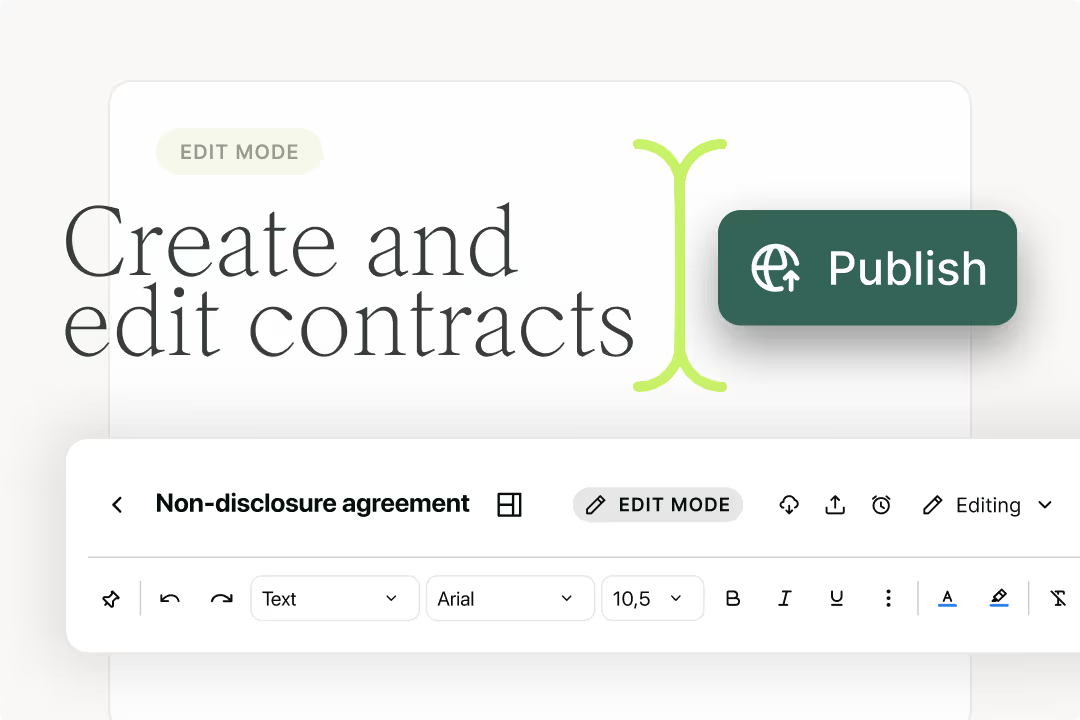Solutions
Customer Support
Resources
This post covers everything you need to know about contractual disputes, from what they are through to how to avoid them, and what happens if you can’t. Let’s dive in.
A contractual dispute is a disagreement between parties to a contract about the performance, terms, or implementation of that contract.
While some people assume that a contractual dispute must involve a breach of contract, this isn’t necessarily true. A breach can result in a contractual dispute, but so can other disagreements, like how a contract should be interpreted, or if one party wishes to amend a contract and the other refuses.
Put simply, a contractual dispute will occur when parties are unable to reach a mutual agreement about the terms of a contract and how they’re performed.

Unfortunately, while the definition of a contractual dispute is simple, the implications of one are less so.
If neglected, contractual disputes can result in significant losses for parties. This is particularly true for commercial contracts where there is a greater contractual risk. In fact, many contractual disputes end up in court, where the breaching party is forced to pay out large sums for their lack of performance.
Contractual disputes can hinder businesses in other ways, too. For example, a contractual dispute could result in a breakdown in the relationship between the parties, meaning that they decide not to renew their contract as a result. It can also result in reputational damage if the dispute becomes public. This can make it harder to acquire new customers and drive new business revenue.
Broadly speaking, contractual disputes can increase the chances of contract value leaking, which has a direct effect on your bottom line.
"If neglected, contractual disputes can result in significant losses for parties. This is particularly true for commercial contracts where there is a greater contractual risk"
Fortunately, businesses can avoid contractual disputes by ensuring that their contracts are watertight and easy to access. There are also a few, more specific things you can do to avoid a contractual dispute. Let’s go through them now.
One of the most common reasons for contractual disputes is when one party has misunderstood the contract’s terms. Given that contracts are typically loaded with legal jargon, this isn’t surprising.
To avoid any ambiguity and misunderstanding, it’s best to draft plain language contracts instead. This means presenting the information within the contract in a way that’s easy to read and understand. By doing this, parties have a clearer view of what’s expected of them.
This is also a great way to build the counterparty’s trust. After all, you’re making a conscious effort to be transparent and straightforward about what their contractual rights and obligations are, rather than trying to mask them.

Contractual disputes also arise when internal stakeholders ask contract managers to act in a way that conflicts with the terms agreed. There are lots of reasons why they might do this. Perhaps they have revised the budget, or there’s a conflict of interests.
Either way, refusing to comply with the terms of a contract can land you in legal trouble, and see the contract discharged.
That’s why it’s important for all internal stakeholders to review contracts before they’re sent out for negotiation and signing. The best way to ensure that a contract has been checked and approved by these stakeholders is to set up a contract approval workflow.
This can be done with ease using a contract automation system like Juro. Juro users can set up automated approval workflows for contracts to ensure they never slip through the net. This can be done at the template level or they can automatically set up approval workflows when certain conditions are met.

Another effective way to avoid a contractual dispute is to standardize your contracts where possible. This often means standardizing the terms within certain types of contracts so that they’re non-negotiable and less susceptible to deviations.
This is useful with simple contracts and can be achieved using different contract templates, like a job offer letter template, option agreement templates or NDA templates, for example.
Some contract management systems will even have features such as conditional logic, which can be used to bake certain clauses into contracts when certain conditions have been met.
For example, Juro users can use conditional logic to automatically add certain exemption clauses into a contract if the contract’s value meets a certain threshold, or if the parties are based in a certain country.
By setting up rules whereby these clauses are automatically added into the contract, commercial teams can self-serve on contracts with less risk.
Reducing this risk and inserting these clauses can be extremely important since a comprehensive can prevent counterparties from wanting to raise a contractual dispute. Similarly, including exemption clauses can deter counterparties from being able to sue for breach of contract (in some circumstances).
Since most contractual disputes stem from parties misunderstanding or forgetting about their contracts, one way to avoid a contractual dispute is being able to refer to the signed copy of the contract and what it actually says.
But this can only be done if your contracts are stored securely and are easily accessible. Too often, parties will sign contracts in wet ink and store them in storage cabinets, or have them scattered across shared drives. The problem with this is that they’re difficult to find and susceptible to damage or tampering.
However, when you store contracts using a robust contract repository, you can keep all of your contracts in one place, making them easier to find and access.

As we mentioned earlier, contractual disputes often arise when a party has failed to perform their duties under the contract on time. It can be easy to fall into this trap if upcoming contract deadlines aren’t tracked properly.
Fortunately, it can be just as easy to avoid this problem. All you need to do is track your contractual obligations and renewal dates. This can be done using a contract management spreadsheet.
Or, if you want to reduce the need for manual data entry, you can track all of this data in a tool like Juro which automatically tracks and compiles this contract data for you. If you use contract reminder software, you can even set up automated reminders to let you know when these deadlines are coming up.
Unfortunately, it isn’t always possible to avoid a contractual dispute, even despite your best efforts. However, it is possible to resolve a contractual dispute and minimize the damage it causes each party.
Most business contracts will outline exactly which procedure parties should follow in the event of a breach or a contractual dispute. Usually, this involves arbitration first, but some disputes may end up in court if they meet certain criteria.
Let’s look at the typical route parties take to resolving a contractual dispute, and how the process works.
If both parties are willing, it’s possible to find a solution to the contractual dispute without the supervision of the court. This could mean renegotiating the contract’s terms, or amending them. It could even mean mutually deciding to terminate the contract.
When deciding on a resolution, you should consider the feasibility and financial implications of your proposal. However, there is still a lot of scope to be creative in finding a solution.
Whatever you decide to do, you should ensure that your decision is captured in writing and signed by all parties. That way, the decision can become binding.
If you’re unable to negotiate a solution with the counterparty without supervision, the next step is to try professional mediation, or alternative dispute resolution (ADR).
Put simply, this process involves working alongside a skilled, neutral mediator to have more helpful and productive negotiations about what the outcome of the contractual dispute should be.
This is a popular way to resolve a contractual dispute since it encourages the parties to maintain their relationship and hopefully reach a settlement that benefits both parties.
Many contractual disputes will also be settled through arbitration, which is an alternative to going directly to court.
During arbitration, parties will submit information about their contractual dispute and present their case to the qualified arbitrators who will eventually make a legally binding decision about the outcome of the dispute and the remedies available to the parties.
According to Citizens Advice, the decision can take up to 45 days from when the proceedings finished. Once the decision has been made, a copy of the decision will be sent to all parties involved, and this will include a detailed explanation of why the decision was made and how the compensation was calculated.
Importantly, you won’t be able to take the arbitrator’s decision to court if you don’t agree with it. This is because it’s legally binding, just like a decision made by the courts. You’ll only be able to appeal the decision if you think the case was handled badly or in a way that’s inconsistent with the law, not because you disagree with the outcome.
Court should only ever be the last resort when it comes to a contractual dispute. This is because court proceedings are lengthy and expensive.
To recap: the best way to prevent contractual disputes is to gain control over your contract process. This can be achieved with better contract drafting, improved visibility, and contract automation features like approval workflows, conditional logic and contract reminders.
To try these features for yourself, or find out more about how Juro can help to reduce contract risk for your business, fill in the form below.

Lorem ipsum dolor sit amet, consectetur adipiscing elit. Suspendisse varius enim in eros elementum tristique. Duis cursus, mi quis viverra ornare, eros dolor interdum nulla, ut commodo diam libero vitae erat. Aenean faucibus nibh et justo cursus id rutrum lorem imperdiet. Nunc ut sem vitae risus tristique posuere.

